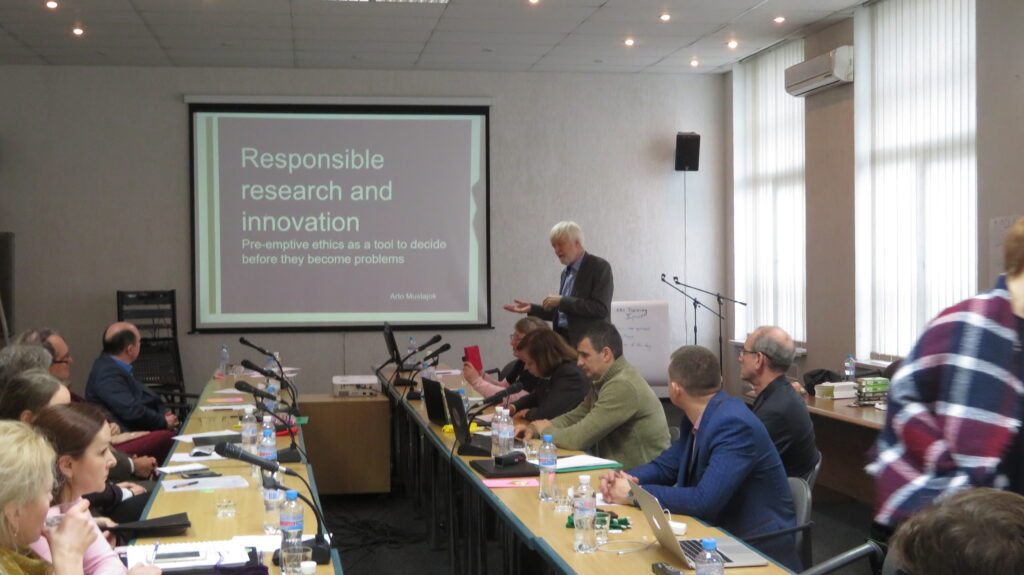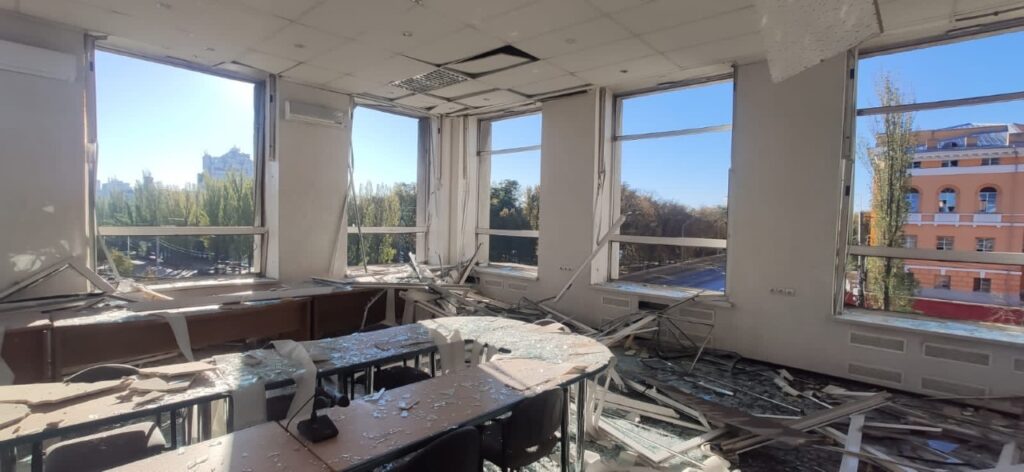Ülle Must and Valentyna Andrushchenko
This article provides an overview of the application of ethical principles in Ukrainian higher education and research institutions. This article is based on the results of the Responsible Research and Innovation (RRI) survey, carried out between June and November 2019. During the study, two contradictory statements caught our attention: “Ukraine is one of the most corrupt countries in the world” and “Ukraine is one of the leading countries protesting against corruption”. Solving this paradox was one of our goals.
The study had two parts: a) Overview about the state-of-art: analysis of legislation, existing projects (H2020, Erasmus+, British Council, American Councils for International Education, etc.), scientific literature, and social media; b) Internet survey (Survey Monkey): questionnaire was sent to a team of experts (H2020 NCPs/PC members, R&D personnel in ministries and research bodies, top 50 universities in Ukraine.
Tackling corruption and research misconduct in Ukraine
Throughout the 21st century, Ukraine has worked to ensure that the statement “Ukraine is one of the most corrupt countries in the world” turns into the statement “Ukraine is one of the leading countries protesting against corruption”. From the perspective of higher education and research, three important organizations were successively created: The National Agency on Corruption Prevention in 2016, the National Agency for Higher Education Quality Assurance in 2019, and the National Research Foundation of Ukraine in 2019.
The National Research Foundation of Ukraine Ethics Principles was approved by the Research Council at the very beginning of its activity, in January 2020. It was preceded by laws that laid the foundation for professional ethics, namely the Law of Ukraine Prevention of Corruption (2014), the Law of Ukraine on Higher Education (2014), and the Law of Ukraine on Education (2017). The draft version of On Academic Integrity has been completed.
In articles published in international scientific journals about the situation in Ukraine, ethics issues are discussed primarily in the realm of academic misconduct and education corruption. These include bribery, fraud, nepotism, cronyism, favouritism, cheating, plagiarism, and so on. In addition, several comparative analyses are presented about the behaviour of Ukrainian students in comparison with students of other countries (Russia, Poland, Switzerland, and USA). The number of articles on plagiarism has also increased in mainstream news media both in Ukraine and in the world. In the latter, special attention is paid to politicians and senior officials.
Ukrainian researchers have created an anti-misconduct site False Science. The aim of the site is to introduce ethical principles and fight against research misconduct. The site contains original materials devoted to the detection of errors and plagiarism in theses defended in Ukraine.
Ukraine in international cooperation programs
Since cooperation and the acquisition and learning of colleagues’ experiences play an important role in any kind of development, international cooperation programs – both at the pan-European level and at the level of different countries – cannot be ignored. Ukraine has been one of the most active participants in EU framework programs among the Eastern Partnership countries. This also applies to topics related to Responsible Research and Innovation.
Horizon 2020 projects (Equal-IST, Equals-EU, Resbios, and RRING) promote an ethics framework for research and innovation. It is worth noting that most of the Ukrainian participants are not from the metropolis but include Simon Kuznets Kharkiv National University of Economics, Kharkiv National University of Internal Affairs, and Ivan Franco National University of Lviv.
Volodymyr Dahl East Ukrainian University (Severodonetsk), Donetsk State University of Management (Mariupol), Luhansk National Agrarian University (Starobilsk) are involved in the REDU project of the British Council, one of the goals of which is increase of social responsibility of universities.
Donetsk National University in Vinnytsia, Zaporizhia National University, Izmail State Humanitarian University, Taras Shevchenko National University of International Relations Institute, Lutsk National Technical University, Odesa National University (named after I.I. Mechnikov), Sumy State University, and Ternopil State Medical University (named after I. Ya. Gorbachevsky), and Kharkiv National University (named after V. N. Karazin) are partners in the Academic IQ project of the American Councils for International Education.
We hope to cooperate with the Erasmus+ project Open Practices, Transparency and Integrity for Modern Academia, run by the National Agency for Higher Education Quality Assurance, which started in 2021 and will last until 2024. One task of the project aims to conduct an all-Ukrainian Complex Academic Integrity and Open Science Survey.
A survey of ethical principles in the Ukrainian research community
In our survey, we wanted to know what the respondents consider to be the main driver for RRI. The majority of respondents considered Open Access (64.7%) and Science Education (61.8%) as quality criteria for good research. Ethics (53.1%) and Gender Equality (56.25%) were regarded as a natural part of an institution’s policy. Open Access (53.3%) was considered as the main requirement for research funders, and rather logically, Public Engagement (70.6%) was the main driving force for the democratic society.
When implementing RRI, the respondents considered personal motivation (50%) to be the most important supportive factor, followed by the existence of an institutional strategy (42.9%). Lack of experience in RRI was seen as the biggest obstacle in implementing RRI, followed by lack of motivation and lack of necessary time due to work overload (both 33.3%).
The majority of respondents felt that almost all elements of RRI have been practically implemented in their work: in terms of ethics issues 61.8%, Open Access and Science Education 60%, public engagement 50%. Only in terms of gender equality, the estimates were less optimistic (45.7%).
We also wanted to know from the respondents what they see as the expected scientific, social, economic and democratic benefits of RRI. The greatest expected scientific benefit was seen in the decrease in scientific misconduct (64.29%). In terms of societal benefits, it was expected that society would learn from science, and that research questions and results would be better aligned with societal needs (both 76.7%). In terms of economic benefit, it was the possibility of new business and funding opportunities (68.97%), and in terms of democratic benefit it was the hope that it enables to create governance that safeguards scientific integrity (85.7%).
The work will continue
A follow-up project “Stair to excellence: enhancement an efficient and solid higher education system in Ukraine” takes place in the period 2022-2024. This project is also supported by the development cooperation funds of the Ministry of Foreign Affairs of the Republic of Estonia.
The current project and its results are affected by Russia’s war with Ukraine – priorities that were important before the war may no longer be so at the moment. Almost a quarter (23.3%) of Ukrainian universities have either been destroyed or have suffered war damage, including unique scientific equipment and facilities, research laboratories, and so forth. About 32 higher education institutions and their units have been relocated from the war area to safer parts of Ukraine (as of October 2022).
We plan to conduct the next survey on ethics governance system in Ukrainian universities in 2024, in the form of an internet questionnaire in combination with structured interviews. This will be preceded by trainings and webinars on the quality of higher education topics: academic recognition, accreditation, university rankings, and research evaluation.
Ülle Must, Education and Youth Board, Estonia
Valentyna Andrushchenko, Centre for Science-Technical Information and Innovation Progress Facilitation in Ukraine, Ukraine


Further reading:
Responsible Research and Innovation in Ukraine. Project report of Behind the Horizon – Supporting the Ukrainian RDI System. November, 2019. 26 pp.
